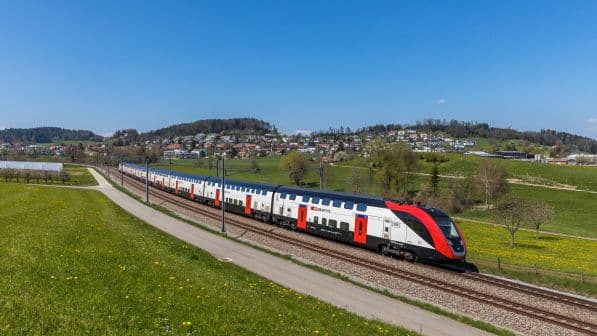SWISS Federal Railways (SBB) and Alstom signed an agreement on March 3 that will see the manufacturer pay the equivalent of the value of six trains in compensation for repeated delays to the delivery of SBB’s FV-Dosto fleet of double-deck long-distance trains.
Alstom and SBB have reached an out-of-court settlement that includes an agreement not to disclose any further details of this compensation.
However, SBB says that Alstom will be responsible for maintaining the fleet beyond the contractually agreed term, and will deliver the spare parts required in the coming years.
The manufacturer will also continue to invest in optimising ride comfort for passengers on the FV-Dosto fleet, working with SBB to optimise train performance. It will also supply and manage simulators to support the training of SBB staff.
SBB awarded Bombardier the contract to supply 59 FV-Dosto trains in 2010. In 2014 the parties agreed a new delivery schedule with Bombardier to supply three extra trains at no additional cost in compensation for production delays.
Test runs with the first trains began in 2015, with the new fleet FV-Dosto entering passenger service in 2018, although initially suffering from poor reliability.
The FV-Dosto contract passed to Alstom following its acquisition of Bombardier Transportation in 2021, and since then SBB says that Alstom has made a great effort to reduce the disruption caused by the poor reliability of the new fleet.
However, in 2022 SBB announced that it was abandoning the use of Wako roll compensation technology on the new fleet, intended to enable the trains to negotiate curves at speeds up to 15% higher than existing rolling stock.
The system had led to complaints from passengers and staff since it was introduced in 2018, and SBB said that it was error-prone and expensive to maintain.
Alstom delivered the last of the 62 FV-Dosto trains in 2022, a year-and-a-half after the project was taken over from Bombardier.
SBB says that the FV-Dosto is now one of its most reliable fleets, forming the backbone of long-distance services in Switzerland. Failures take place only every 15,000-20,000km, above the average for the rest of the SBB passenger fleet, with train cancellations due to failures now at the same level as the existing fleet.
For detailed data on fleet orders from around the world, subscribe to IRJ Pro.

